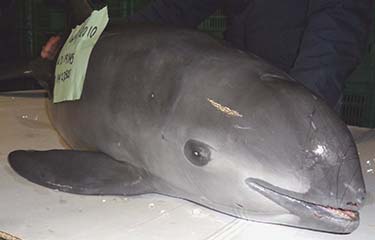The Secretariat to the Convention on International Trade in Endangered Species of Wild Fauna and Flora (CITES) has announced sanctions against Mexico for its failure to take action to protect the critically endangered vaquita porpoise.
As a result of the sanctions, Mexican companies will be prohibited from exporting 40,900 wildlife products protected by CITES against overexploitation through international trade, including more than 3,000 commercially exported items including crocodile and snake skins, mahogany wood, pet reptiles and spiders, orchids, and cactuses.
“The government of Mexico has only itself to blame for these long-overdue sanctions as multiple administrations have shamefully failed to protect the vaquita – the country’s only endemic cetacean species – from dying in illegal gillnets,” Animal Welfare Institute Wildlife Biologist DJ Schubert said in a press release.
An estimated eight vaquita remain alive in the wild as a result of illegal fishing of shrimp and fish, including the endangered totoaba, which is in demand in China for its swim bladder. The U.S. government has already implemented a ban on Mexican seafood from the vaquita and totoaba habitat in the Upper Gulf of California.
In November 2022, CITES directed Mexico to prepare a compliance action plan that would address its shortcomings in regulating the capture and trade of totoaba and the bycatch of vaquita, but a Mexican plan submitted 27 February, 2023, failed to meet this directive, according to the Mexican Secretary of Foreign Relations.
“The Mexican government believes the country is being treated unfairly in that its efforts – publicly recognized by CITES – are not being taken into account. Despite this, Mexico is open to dialogue and is willing to address CITES' observations,” it said in a press release. “The government of Mexico reports that it is willing to discuss the observations and resolve them satisfactorily, despite the fact that it believes this treatment to be unfair because it does not take into account the exhaustive efforts and many actions taken by Mexico.”
CITES said Mexico has not proven it is capable or willing to enforce the plan, according to the press release. In response, Mexico said it sent a high-level delegation to CITES headquarters in Geneva, Switzerland, on Monday, 27 March, to review the observations and explain the work Mexico has done and will commit to under its plan. The Mexican government asked for CITES to “carry through with its offer to finance studies on the Upper Gulf of California,” and to look into the countries buying illegal totoaba products sourced from Mexico.
“Regarding the problem of illegal totoaba trafficking, the transit and destination countries are co-responsible,” it said.
Parties to CITES have warned Mexico for years that it must increase enforcement and remove deadly fishing nets from the vaquita’s habitat, Natural Resources Defense Council Global Biodiversity Director Zak Smith said. Although the Mexican government claims to be committed to vaquita conservation, a report last year by the International Union for Conservation of Nature’s Cetacean Specialist Group found the country continued to allow illegal fishing in the vaquita’s habitat, he said.
“Mexico is rightly facing the consequences of its failure to control illegal fishing that is causing the vaquita’s extinction,” Smith said. “For decades, the international community has been urging, imploring, and begging Mexico to meet its legal obligations. Broad sanctions are appropriate and should stay in place until Mexico demonstrates results.”
According to Center for Biological Diversity International Program Director Sarah Uhlemann, some progress has been made in curtailing illegal fishing, but fishing vessels continue to operate both inside a zero-tolerance area and in a vaquita refuge surrounding it.
“While no one relishes economically painful sanctions, all other efforts to push Mexico to save the vaquita haven’t been enough,” Uhlemann said. “The strongest measures possible are needed to wake up the Mexican government and prompt it to finally save this tiny porpoise from extinction.”
The Mexican government banned the use of gill-nets in the Upper Gulf of California in 2017, and promised to provide compensatory payments to fishermen and training on using less-destructive fishing methods. But the administration Mexico President Andrés Manuel López has largely refused to spend money to compensate fishermen for staying out of the vaquita refuge and to stop using gill-nets, according to ABC News.
“There is no alternative fishing gear” being offered, according to Lorenzo Rojas, a marine biologist who leads an international committee working to save the vaquita. “The fisheries authorities have been notable for their absence.”
Environmental Investigation Agency Ocean Campaigner Sarah Dolman called on the Mexican government to do more to save the vaquita and totoaba.
“This CITES decision throws a lifeline to the world’s most-endangered marine mammal. Mexico urgently needs to implement a robust action plan with clear timeframes and corresponding milestones for action, and we urge consumer and transit countries to support Mexico by cracking down on the illegal trade in totoaba fish maws,” Dolman said.
Photo courtesy of the International Union for Conservation of Nature







